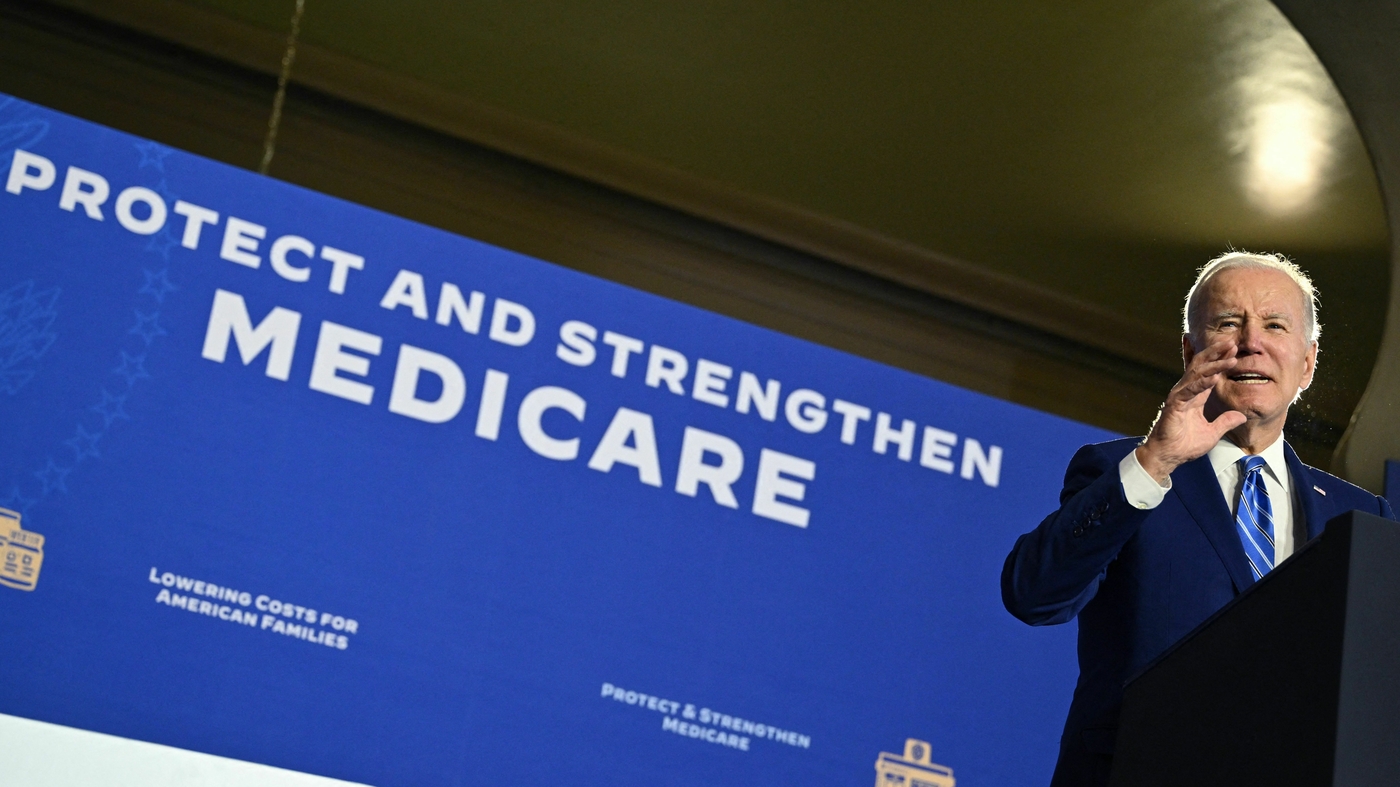

Last week in Florida, at the College of Tampa, President Joe Biden promised to protect and improve Social Stability and Medicare, as perfectly as reduce wellbeing treatment expenses.
Mandel Ngan/AFP through Getty Illustrations or photos
cover caption
toggle caption
Mandel Ngan/AFP by way of Getty Illustrations or photos

Final 7 days in Florida, at the College of Tampa, President Joe Biden promised to defend and strengthen Social Security and Medicare, as perfectly as decrease health treatment fees.
Mandel Ngan/AFP by way of Getty Photographs
The Medicare wars are back, and nearly no a person in Washington is surprised.
This time it’s Democrats accusing Republicans of wanting to maim the incredibly well-known federal wellbeing plan that handles 64 million seniors and persons with disabilities. In the past, Republicans have productively pinned Democrats as the risk to Medicare.
Why do politicians persistently wield Medicare, as well as Social Safety, as weapons? Because background demonstrates that is effective at the ballot box. Typically, the social gathering accused of menacing the sacrosanct entitlements pays a price tag — despite the fact that it is really the thousands and thousands of beneficiaries relying on feuding lawmakers to preserve the plans funded who stand to drop the most.
Republicans have consistently warned they would hold boosting the federal debt ceiling hostage except if Democrats negotiated variations to Medicare, Medicaid, and Social Stability. The three applications collectively, alongside with funding for the Reasonably priced Treatment Act and Children’s Overall health Insurance policies Method, account for just about fifty percent of the federal price range.
The political bomb that went off all through President Joe Biden’s State of the Union speech experienced been ticking for months. In his speech, Biden threatened to veto any Republican initiatives to minimize Social Stability or Medicare. It was a person of only three veto threats he built that night. For the duration of a excursion to Florida after the speech, he claimed it extra forcefully: “I know a whole lot of Republicans, their aspiration is to reduce Social Protection and Medicare. Properly, enable me say this: If that’s your aspiration, I’m your nightmare.”

Senior Republicans have distanced themselves from the proposals Biden was referencing, notably suggestions from the Property Republican Review Committee and Sen. Rick Scott, R-Fla., to make cuts or even let Medicare expire until Congress votes to continue to keep it heading.
“That is not the Republican approach that is the Rick Scott program,” Senate Minority Chief Mitch McConnell claimed on a Kentucky radio present Feb. 9, echoing his opposition to the prepare final year.
“Cuts to Social Safety and Medicare are off the desk,” Property Speaker Kevin McCarthy declared the working day prior to Biden’s veto risk.
McConnell and McCarthy know one thing that Rick Scott seemingly does not: Politicians threaten large, preferred entitlement programs at their peril. And, generally, it can be been Republicans who endure the electoral outcomes.
How Medicare fights have shaped elections
This dates at the very least to 1982, when Democrats utilised threats of Republican cuts to Social Safety to decide up far more than two dozen Property seats in President Ronald Reagan’s to start with midterm elections. In 1996, President Monthly bill Clinton received reelection in aspect by convincing voters that Republicans led by Household Speaker Newt Gingrich needed to privatize Medicare and Social Stability.
At the beginning of his next expression, in 2005, President George W. Bush built it his leading priority to “partially privatize” Social Safety. That proved singularly unpopular. In the next midterm elections, Democrats won back again the Property for the very first time because shedding it in 1994.
In 2010, Republicans turned the tables, using what they described as “Medicare cuts” in the Economical Care Act to sweep again to electrical power in the Residence. (People “cuts” had been mainly reductions in payments to providers beneficiaries really received additional rewards via the ACA.)
The use of the Medicare cudgel likely arrived at its zenith in 2012, when Democrats took goal at Medicare privatization proposals supplied by Paul Ryan, the Property Finances Committee chair and Republican vice presidential prospect. That discussion created a controversial political advertisement, paid for by the progressive Agenda Undertaking Action Fund and recalled by several in Washington, that showed a suited guy in a crimson tie – presumably, Ryan – dumping a wheelchair-certain “granny” off a cliff as the phrases flashed, “Is The united states Stunning without having Medicare?”


The reality is that Medicare’s price as a political weapon also sabotages any work to appear with each other in a bipartisan way to fix the program’s financing issues. The previous two instances the Medicare Clinic Insurance policies Belief Fund was this shut to insolvency — in the early 1980s and late 1990s — Congress handed bipartisan charges to keep the plan afloat.
A person person’s ‘cut’ can be another’s ‘benefit’
Even the term “slash” can be political. Just one stakeholder’s Medicare “lower” is another’s gain. Lowering payments to healthcare providers (or, extra often, reducing the dimensions of payment raises to medical practitioners and hospitals) might decrease rates for beneficiaries, whose payments are based on total fees of the Medicare software.. In the meantime, elevating premiums or value sharing for beneficiaries is a gain to all taxpayers, who enable fund Medicare. Increasing out there advantages assists medical doctors, hospitals and other overall health companies, as properly as beneficiaries, but fees additional for taxpayers. And on, and on.
There are fundamental discrepancies in between the parties that won’t be able to be papered about. A lot of Republicans want Medicare to change from a “outlined benefit” program — in which beneficiaries are assured a certain set of products and services and the governing administration pays no matter what they charge — to a “outlined contribution” plan, in which beneficiaries would get a sure amount of money of funds to finance as considerably as they can — and would be on the hook for the rest of their health-related costs.
This would shift the hazard of overall health inflation from the governing administration to seniors. And whilst it plainly would reward the taxpayer, it would disadvantage both of those companies and the folks on Medicare.


But there are many, many intermediate ways Congress could just take to at minimum hold off insolvency for both equally Medicare and Social Protection. Some are much more controversial than other people (elevating the payroll tax that money Medicare, for instance), but none are further than the actions prior Congresses have taken every time the packages have neared insolvency.
Republicans are correct about this: Medicare and Social Protection cannot be “fastened” till both of those sides lay down their weapons and start off talking. But each and every time a politician unsheathes their chatting factors about “Medicare cuts,” that truce seems a lot less and less attainable.





